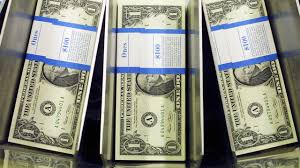Why the U.S. dollar isn’t so mighty anymore

It’s been a tough start to 2018 for the greenback.
The U.S. dollar has already lost nearly 2% of its value against other currencies and is trading at its lowest level in more than three years. This follows a 10% decline for the dollar in 2017.
What’s going on? At first blush, the drop is a bit of a mystery because the Federal Reserve has been raising interest rates for the past year.
Rate hikes usually boost the dollar’s value because they cause more foreign investors to buy American assets. They also help keep inflation in check.
The U.S. economy has enjoyed two consecutive quarters of solid growth as well, and strong holiday sales suggest that trend continued at the end of the year. Many experts are predicting even more momentum for the economy from the recent tax cuts.
But take a step back and it shouldn’t be a surprise that the dollar is slumping. Nor should it be a major concern just yet.
Hussein Sayed, chief market strategist at FXTM, an online currency brokerage firm, wrote in a report Monday that signs of life in Europe’s economy, particularly Germany and France, are causing some investors to flock to the euro instead of the dollar.
Sayed added that the resurgence in Europe even has more investors betting that the European Central Bank will unwind its massive bond-buying program, similar to the Fed’s after the 2008 financial crisis, sooner than expected.
Related: Dollar starts 2018 on the wrong foot
That would push up European bond yields and make the euro even more attractive compared with the dollar. Some even speculate that the ECB could start to raise interest rates later this year or early next year.
So the dollar’s “weakness” may be only relative. Europe is on the mend, and investors are betting on that.
But the dollar’s slide can’t be pinned entirely on what’s happening overseas. Some analysts suggest that political dysfunction in the United States is also pushing the dollar down.
Boris Schlossberg, managing director of foreign exchange strategy at BK Asset Management, said in a report Monday that “there is more to dollar weakness than just the global feel-good story.”
Schlossberg said more investors are starting to believe there is a real chance of a government shutdown in Washington later this week. That would happen Friday unless Congress passes a short-term funding resolution to keep the government open.
“The weakness in the buck suggests that the move is political as well as economic as global investors grow increasingly concerned about the chaos in Washington DC,” Schlossberg said in his report.
It’s unclear whether a deal can be reached given Republican opposition to the Obama-era Deferred Action for Childhood Arrivals immigration program. Under DACA, undocumented immigrants who came to the United States as children are protected from deportation.
President Trump has hinted that he might be willing to make a deal with Democrats, but only if they back his plan for tougher security measures on the Mexican border. That may be a non-starter.
The growing controversy about Trump’s reported reference to El Salvador, Haiti and African nations as “shithole countries” has only made things more uncertain. Trump has even taken the unusual step of denying that he’s a racist.
“After the rancor of the past few days, the risk of the government shutdown has increased and that factor could be weighing on the dollar as well,” Schlossberg added.
Related: The dollar’s Trump bump has vanished
But will the dollar’s weakness actually hurt the U.S. economy or stock market? So far that doesn’t seem to be the case. In fact, it might even help.
Trump said on several occasions in 2017 that he thought the dollar was too strong and wouldn’t mind if it lost some of its value — despite his “America First” agenda.
A weaker dollar lifts the value of foreign sales and profits for U.S. multinational companies like Apple (AAPL), Microsoft (MSFT), Johnson & Johnson (JNJ), Exxon Mobil (XOM) and Procter & Gamble (PG) once they are translated back into dollars.
And many of those giant U.S. firms have helped lead the market to numerous record highs in the past year.
It’s true that a continued (and steeper) decline in the dollar could eventually become a problem. A massive dollar dump could bring about a big surge in inflation that nobody would want.
But that scenario seems unlikely anytime soon. Despite the wackiness in Washington, most global investors still view the dollar as the world’s most stable reserve currency. The euro, China’s yuan, gold and bitcoin are unlikely to replace the greenback just yet.

